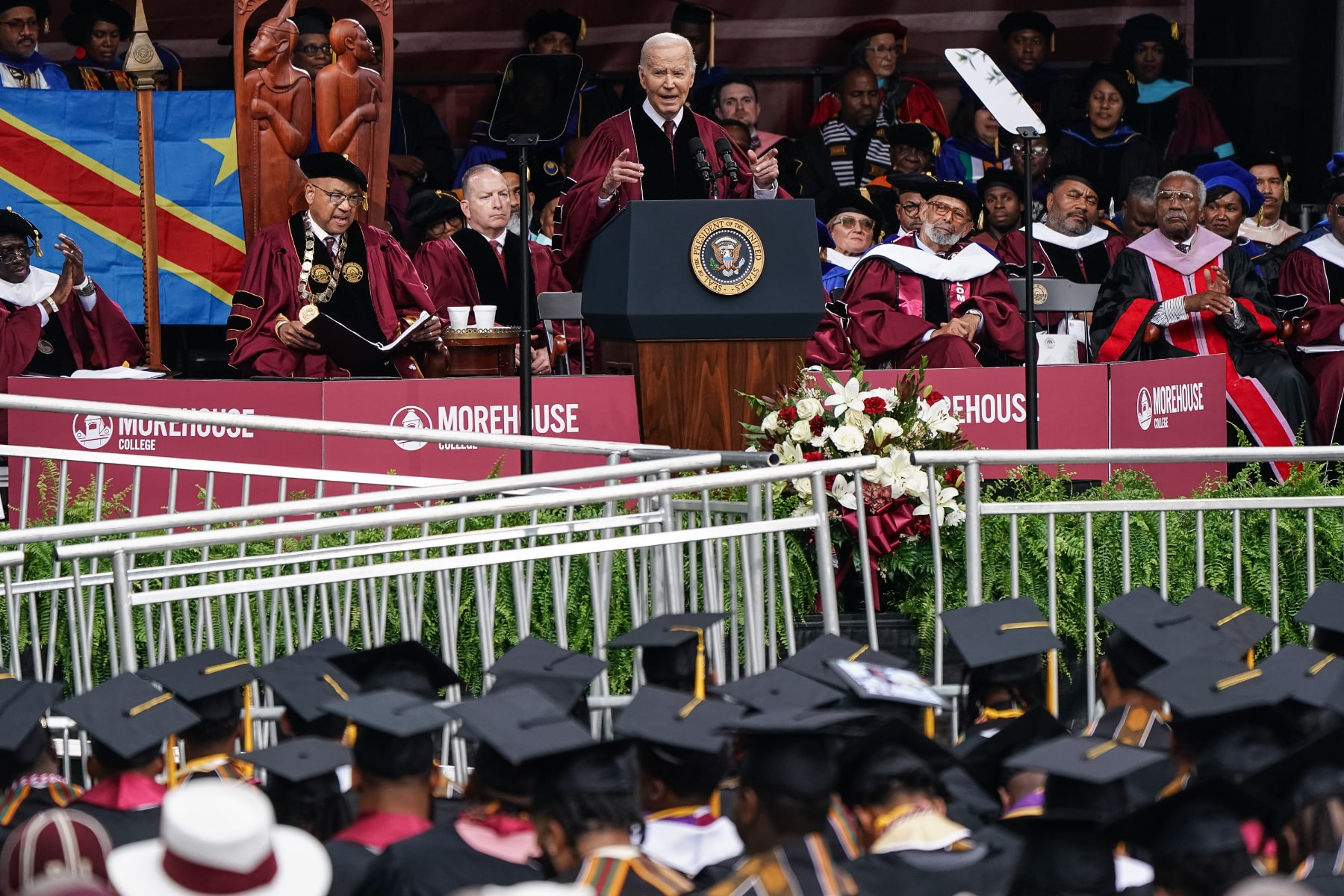This column first appeared in The Amendment, a biweekly newsletter by Errin Haines, The 19th’s editor-at-large. Subscribe today to get early access to future analysis.
Speaking at Morehouse College in Atlanta on Sunday, President Joe Biden laid out a vision of manhood focused on faith, family, freedom and the future, using his commencement address to talk to graduates, voters and a global audience.
It is a definition of masculinity that is important not just for men, but for the people their decisions could impact, including women, LGBTQ+ people, and others from marginalized communities. And it is particularly important for men in leadership positions.
Headed into the speech to the class of 2024, Biden had other tests to pass. Among them: shore up his support among Black men before November, address the conflict in Gaza and make the case for the value of democracy.
For Biden, the common thread linking these themes was to call out toxic masculinity and extremism. A White man six decades older than his audience, the president leaned on his personal story and his admiration for Morehouse’s most famous alum, the Rev. Martin Luther King Jr., to challenge traditional notions of strength, power and leadership.
Biden speaks openly about his Catholic faith, and he opened his remarks at Morehouse with scripture and a reference to the joy of Resurrection Sunday after the grief Saturday over Jesus’ crucifixion, when “his disciples felt all hope was lost.”
“In our lives and the lives of the nation, we have those Saturdays,” Biden said. “But what work is done on Saturday to move pain to purpose? How can faith get a man, get a nation, through what was to come?”
Biden talked about how faith helped him grapple as a young law school graduate with King’s assassination, which he said led him to a career in politics. And when personal tragedy struck, with the death of his young wife and daughter just after he was elected to the U.S. Senate, and then decades later when his son, Beau, died of brain cancer, his faith held him up and kept him going. He noted that many of the graduates and others in the audience may have been similarly inspired over the last four years by loss, having survived the pandemic when loved ones did not, or in watching the murder of George Floyd.
Biden said it was “natural” at such times for them to question democracy.
“What is democracy if Black men are being killed in the street? What is democracy if a trail of broken promises still leave Black communities behind? What is democracy if you have to be 10 times better than anyone else to get a fair shot? And most of all, what does it mean … to be a Black man who loves his country even if it doesn’t love him back in equal measure?”
Highlighting our country’s complicated history has been rare for the 45 White men U.S. presidents and the lone Black man to ever occupy the White House. For Biden — who decided to run after then-President Donald Trump declared there were “very fine people on both sides” of the violence at a white supremacist rally in Charlottesville, Virginia — how he has tackled racism and inequality is key to his reelection pitch.
During his speech on Sunday, Biden touted his record: nominating the first Black woman to the Supreme Court, lowering the child poverty rate, providing money for small business and homeownership and record funding for historically Black colleges like Morehouse. It was all met with some applause from the crowd.
-
Listen To The Amendment Podcast:
-
Listen To The Amendment Podcast: The Amendment podcast: The Undoing of Roe with Shefali Luthra
Biden also confronted the issue on the minds of many young American students, including those on college campuses that have been the sites of protests in recent weeks, asking: “What is democracy if we can’t stop wars that break out and break our hearts?”
The president called the conflict in Gaza a “humanitarian crisis,” reiterated his call for a ceasefire and the need for a solution for Israel and Palestine to co-exist, and said he was “working around the clock” to get more aid into the region.
“Leadership is about fighting through the most intractable problems,” Biden said. “It’s about challenging anger, frustration, and heartbreak to find a solution. It’s about doing what you believe is right, even when it’s hard and lonely.”
Among the sea of graduates, several young men turned their backs in silent protest during his remarks. There was also applause. Absent were any notable disruptions or more strident forms of dissent during the ceremony.
Biden referred to the graduates as “future leaders” while also warning that they would confront “old ghosts in new garments” who don’t see these men that way and who are threatening their freedom: state and federal lawmakers who make it hard for Black poll workers and voters to fairly and equally participate in our elections; insurrectionists who refused to accept the results and violently attempted to overturn the 2020 election; “extremists” driving the culture wars around diversity in our schools and workplaces.
In driving his message home, he tied together the ideas of democracy and masculinity as what define the men of Morehouse and what it means to be a man in America.
“They peddle a fiction, a caricature of what being a man is about — tough talk, abusing power, bigotry,” Biden said. “Their idea of being a man is toxic … But that’s not you. It’s not us. You all know and demonstrate what it really means to be a man.”
Instead, Biden linked strength to respect and dignity, and rejected the politics of racial division.
“It’s about giving hate no safe harbor and leaving no one behind and defending freedoms. It’s about standing up to the abuse of power, whether physical, economic or psychological. It’s about knowing faith without works is dead.”
Polling has shown some Black and Latino men peeling off from Democrats, possibly attracted by Trump’s embrace of a traditional masculinity. That vision of masculinity leaves little room for women and LGBTQ+ people to have power and to help shape our democracy. For Biden to win, he has to woo at least some of those men back — and the weekend’s speech at Morehouse was an attempt to prove that masculinity is not at odds with embracing the rights and dignity of others.
In many ways, the 2024 election will be about which vision of masculinity voters want for the future, and what it means for those on the receiving end of their policy and politics — particularly women, people of color, LGBTQ+ Americans and other marginalized groups. With two men again on the ballot this fall with divergent views on the direction of the country, the one we elect will impact all of our lives, and will do much to define our democracy.







